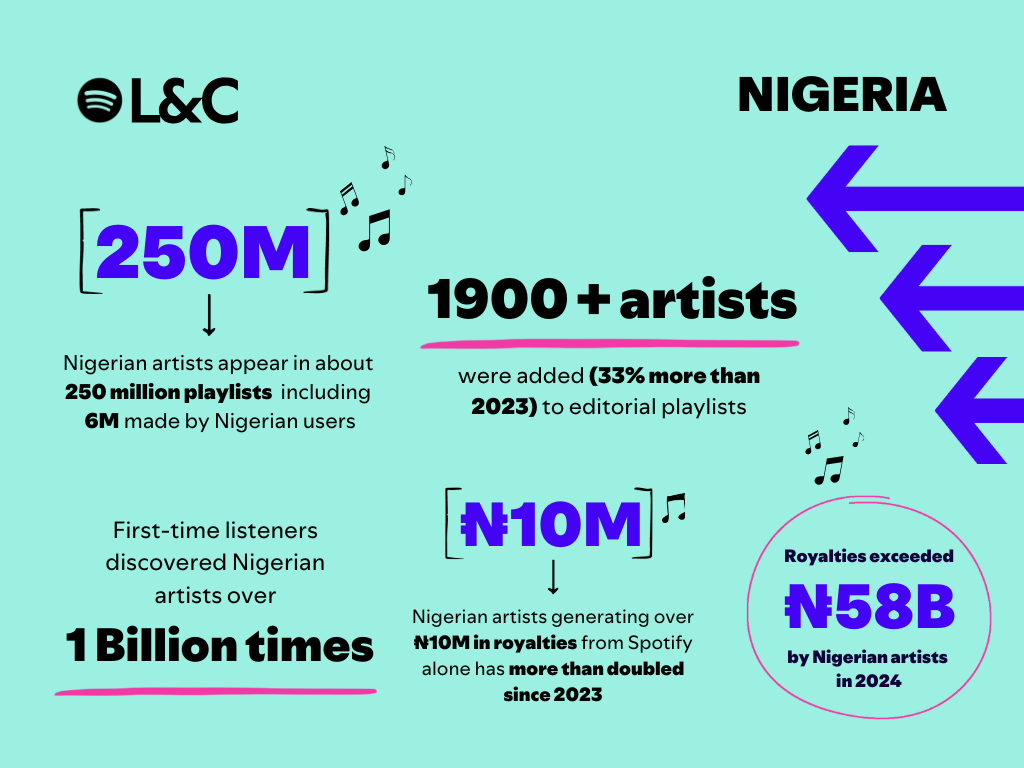
In 2024, Nigerian artists earned over ₦58 billion from Spotify royalties alone; more than double what they earned the previous year. This monumental growth in royalties underscores a simple but powerful truth: intellectual property (IP), whether in music, books, film, or publishing rights, is no longer a niche or romantic investment. It’s fast becoming one of the most lucrative, resilient, and forward-looking asset classes, especially in Africa where creative industries are finally getting the infrastructure, payment systems, and global audience attention they deserve.
For investors in Nigeria and beyond, this presents a rare opportunity. Unlike many traditional assets that are tied to inflation, political risk, or commodity cycles, intellectual property investment in Nigeria represents streams of cash flows that can compound over time. But success in this space depends on understanding rights, risk, reward, and the future trajectory of media consumption. Let’s explore what you need to know.
What Makes Intellectual Property Investment in Nigeria Attractive
Here are 4 major insights you should consider if you plan to invest in music royalties, book rights, or similar IP-based assets.
1. Growing Revenue Streams & Global Demand
The data is already clear: streaming platforms like Spotify, Apple Music, Boomplay, and others are increasingly paying out royalties to African artists. In 2024, Spotify’s “Loud & Clear” report showed Nigerian artists earned ₦58 billion, more than double the figure from 2023. Similarly, independent and lesser-known artists are starting to earn significant income thanks to digital streaming and global visibility.

Books are following a similar, though slower, trajectory: the UNESCO reports estimate that Africa’s book industry has untapped revenue potential; if local investment, publishing infrastructure, and policies improve, the sector’s value could more than double. What this means: the demand exists; the monetization models are improving; risk in execution remains, but the upside is growing rapidly.
2. Diversification & Passive Income
One of the biggest benefits of investing in royalties or book rights is that you don’t need to build from scratch; you can buy existing rights or contracts. These assets often provide passive, ongoing income: once you own a share of the royalty stream, every play, sale, license, or print contributes to your returns.
For high-net-worth individuals who already have exposure to real estate, stocks, or business, IP rights provide diversification beyond traditional risk-correlated assets. They are less tied to interest rates or real-estate cycles; instead, they depend on consumption, licensing, media, and publishing trends.
3. Structural, Legal & Payment Ecosystem Risks
Of course, it’s not all upside. Royalties and rights depend heavily on enforceable legal agreements, reliable royalty collection, clear ownership, and transparent payment cycles. In Nigeria, for example, bodies like the Copyright Society of Nigeria (COSON) and the Musical Copyright Society of Nigeria (MCSN) play critical roles in tracking, licensing, and distributing royalties.
But challenges persist: delays in royalty payments, disputes over rights (publishing vs mechanical vs performance), currency risk (when payments come in foreign currencies), and weak enforcement of contracts. As an investor, knowing who is collecting, how, and how rights are structured is essential.
4. Scalability & Hybrid Opportunities (Digital, Print, Licensing)
IP investments aren’t just about collecting royalties; many uses and revenue channels exist. Consider licensing (for film, ads, synchronization), reprints/editions (for books), translation rights, audio/ebook formats, international sales, merchandising, and more.
In music, for example, beyond streaming revenue, synchronisation (sync) placements (in films, ads, TV) can provide large, lump-sum payments. In books, adapting into audiobooks, foreign translations, and digital versions can multiply returns. The cost of making and distributing digital and audio versions has dropped significantly, making hybrid revenue models increasingly attractive.
Let’s look at a realistic example to see how this plays out on the ground between a Nigerian artist and a publishing house.

In 2022, a mid‐tier Nigerian musician entered into a deal where he assigned a portion of his music royalties for his top tracks. Suppose you invest in that royalty stream by purchasing 20% of those rights. Over 2023 and 2024, the musician’s streaming income skyrockets due to playlist placements, international exposure, and growth in Nigerian streaming consumption. As a result, your 20% share begins to pay out substantial monthly income, enough to outperform many fixed-income investments, especially when adjusted for inflation and currency devaluation.
Simultaneously, a small but growing Nigerian publishing house, Masobe Books, raised local investment, expanded its catalog, and sold nearly 60,000 copies of 41 titles in 2024. They also struck distribution deals across West Africa, leading to multiple streams of revenue: print, e-book, translation, and rights licensing. For investors who had contributed to acquiring certain rights (e.g., translation or foreign market rights), returns came via royalties and licensing fees, making the book rights investment scale beyond domestic markets.
These real-life cases show that with correct structuring, diversified channels, and good legal groundwork, IP investments can yield both current income and long-term capital appreciation.
What Professionals & Investors Should Do
If you’re considering entering this space, here are strong, usable steps to get started wisely:
- Identify Strong Rights Deals & Perform Due Diligence
Before investing, ask for clear documentation: registration with relevant copyright societies (COSON, MCSN, etc.), royalty history (streams, sales, license fees), splits (what share is publishing vs recording vs performance). Engage IP lawyers who understand Nigerian copyright law. - Value the Rights Correctly
Use multiple data points: past royalty payments, streaming figures, licensing agreements, and recent trends. Project future income (3-5 years), factoring in growth in streaming, podcasts, audiobooks, and translations. Also factor in risks (currency, enforcement, market changes). Discount future cash flows accordingly. - Diversify Within IP & Across Channels
Don’t put all your capital into one track, one artist, or one book. Spread across multiple artists/authors, different types of IP (music, books, art licensing). Also, pursue hybrid revenue channels, e.g., your investment may pay via streaming + licensing + foreign market editions. - Negotiate Terms Favorable to Long-Term Income
Seek agreements where you have transparency, possibly minimum royalties, clear termination clauses, rights reversion if needed, and rights to explore derivative works (audiobook, sync, translation). For music especially, seek exposure via sync licensing, which can yield large, non-recurring payments on top of streaming. - Monitor & Adapt to Emerging Models
Keep an eye on fractional ownership platforms, NFT-based royalty sharing, digital distribution innovations, and changes in royalty collection. Be ready to adapt: e.g., if an artist consents to streaming + sync licensing globally, you may reap more benefit than streaming alone. - Protect & Maintain Rights
Secure your rights legally, protect them from infringement, ensure your IP is registered where required, monitor usage (so unauthorized copying or use is caught), and maintain good contracts with administrators. Also, maintain physical or digital archives (for books, manuscripts; for music, masters) where needed.

Final Thought
Intellectual property investment in Nigeria, music royalties, book rights, and licensing are no longer just passion projects. They are fast-emerging asset classes with proven income streams, especially in Nigeria and Africa, where creative talent is global and consumption is on the rise. For business-oriented professionals, high-net-worth investors, and long-term thinkers, they offer diversification, inflation protection, and exposure to global markets.
As with all good investments, success depends on discipline, legal clarity, diversification, and a forward-looking view of how media and consumption are evolving. With the right rights, the right deals, and the right partners, investing in IP can yield both regular income and long-term wealth, turning creativity into capital.

Leave a Reply